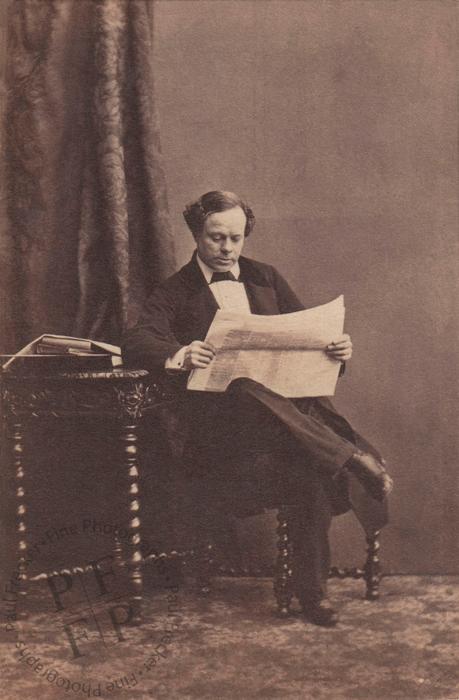Jimmy Rogers
(1821-1863)
'Mr James Rogers was born in 1821, and was the son of the well-known engraver of that name who had gained a reputation by illustrating Oxberry's Dramatic Biography and other theatrical works. He was intended for the same vocation, and entered the house of Messrs. Tallis and Co., St John-street, but though evincing great promise as an artist, his predeliction for the stage induced him to seize the first opportunity that presented itself of trying his powers as a comedian, and when Mr George Wild took the Olympic Theatre, in 1841, he got himself enrolled as one of the company. His peculiar humour soon obtained recognition, and his remarkably characteristic performance of an itinerant vendor in E. L. Blanchard's drama The Road of Life, which had a long career through the following season, established his position with the public. Mr Rogers first made his mark as a burlesque actor in Mr C. J. Collins's extravaganza of Good Queen Bess, which was produced at the Strand Theatre some seven years ago. In this burlesque Mr Rogers played the Maiden Queen, and so decided was the bit he made of it, [...] he was engaged by Mr Wigan as one of the members of the Olympic company [...] Parts were then specially written for him, and he advanced every year in popularity till, in the Strand burleques of Mr Byron, he became acknowledged as the great favourite of that establishment. His originality of style, and the artistic power that he displayed in working up the slightest materials, showed a fund of natural humour, and a keenness of observation, which gave a peculiar distinctiveness to everything he did. [...] In private life he was the most amusing of companions, and the quaint humour of his conversation will be much missed in those social circles where he was always so heartily welcomed. In the autumn of 1857 Mr Rogers visited America, but he returned the following summer to the London stage, and from that time fulfilled engagements at the Lyceum and the Strand, making his first appearance at the St James's Theatre last Easter Monday. He was twice married, and has left behind him a wife and two sons to mourn his loss. He will be buried at Brompton Cemetery next Tuesday about twelve o'clock (The Era, 19 April 1863).

